考研英语:语法大全(情态动词-can,could).doc
(完整word版)情态动词can(could),may(might)的用法
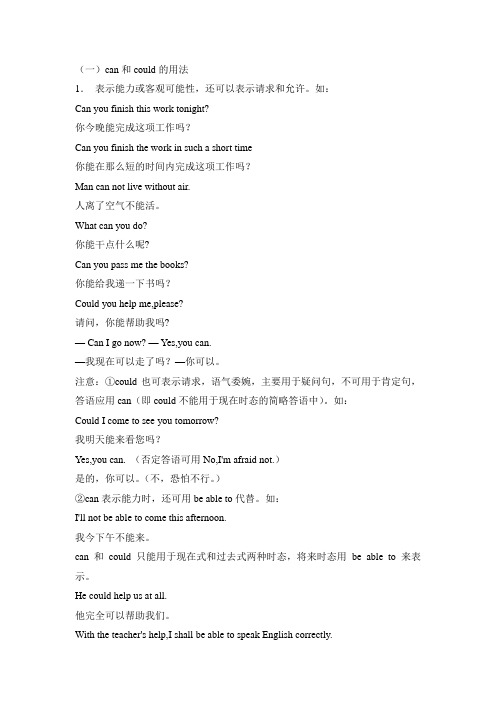
(一)can和could的用法1.表示能力或客观可能性,还可以表示请求和允许。
如:Can you finish this work tonight?你今晚能完成这项工作吗?Can you finish the work in such a short time你能在那么短的时间内完成这项工作吗?Man can not live without air.人离了空气不能活。
What can you do?你能干点什么呢?Can you pass me the books?你能给我递一下书吗?Could you help me,please?请问,你能帮助我吗?— Can I go now? — Yes,you can.—我现在可以走了吗?—你可以。
注意:①could也可表示请求,语气委婉,主要用于疑问句,不可用于肯定句,答语应用can(即could不能用于现在时态的简略答语中)。
如:Could I come to see you tomorrow?我明天能来看您吗?Yes,you can. (否定答语可用No,I'm afraid not.)是的,你可以。
(不,恐怕不行。
)②can表示能力时,还可用be able to代替。
如:I'll not be able to come this afternoon.我今下午不能来。
can 和could 只能用于现在式和过去式两种时态,将来时态用be able to 来表示。
He could help us at all.他完全可以帮助我们。
With the teacher's help,I shall be able to speak English correctly.由于老师的帮助,我将能准确地讲英语。
2. “can”表达推测例:Can the news be true? 这消息会是真的吗?The news can't be true. 这消息不会是真的吧。
(完整版)情态动词must、can、could、may、might精解

would :1. 表will的过去,用于过去将来时2. 表"意愿",乐意做某事3. 虚拟语气could: 1. 表can的过去,表过去的能力2 表请求(婉转语气)3. 表猜测:可能是...4. 虚拟语气should: 1. 表shall的过去,用于过去将来时,搭配第一人称2. 表婉转的语气: 应该做...3. 虚拟语气might: 1. may的过去,表猜测:可能是2. 表许可(婉转语气)may: 1. 表猜测: 可能是2. 表许可think of 想起, 想到; 没有think from的用法一.shall和will的用法1、shall 用在第一、三人称,will 用于第二人称表示“征求意见”。
Shall I go now?Shall we invite her, too?Will you help me with the work?Shall the reporters wait outside or what?2、shall表示依据规定有义务去做。
Passengers shall not talk with the driver while the bus is moving.3、shall 用于所有人称,表示说话人的许诺、威胁、警告、命令等。
You shall have an answer by tomorrow.If he’s good, he shall have a new watch for Christma s.If you children don’t do as I tell you, you shan’t go to the party.4、would 可以表示过去的习惯(would 可表示反复发生的动作或某种倾向。
used to表示过去的习惯动作或状态,强调现在已不存在)He would come to see me on Sunday when he was here.The dog would lie there in the sun all afternoon.When we were children, we would go skating every winter.5、will可以表示“愿意”,而非将来:I will pay you for it. 我会付给你钱买下它的。
考研语法小知识:情态动词can和could
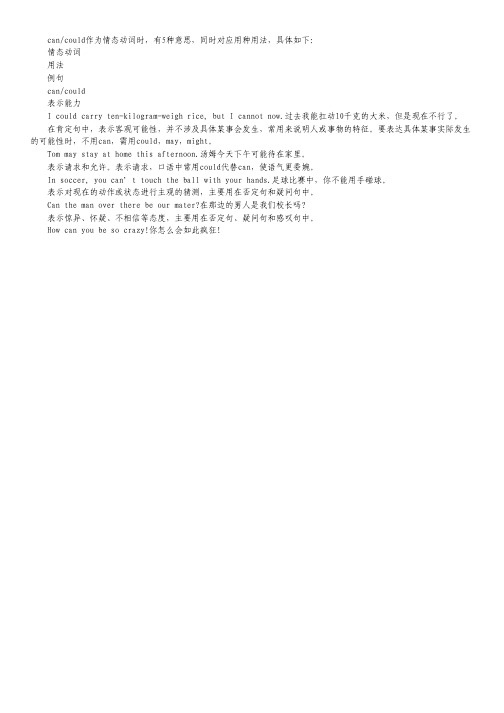
can/could作为情态动词时,有5种意思,同时对应用种用法,具体如下:
情态动词
用法
例句
can/could
表示能力
I could carry ten-kilogram-weigh rice, but I cannot now.过去我能扛动10千克的大米,但是现在不行了。
在肯定句中,表示客观可能性,并不涉及具体某事会发生,常用来说明人或事物的特征。
要表达具体某事实际发生的可能性时,不用can,需用could,may,might。
Tom may stay at home this afternoon.汤姆今天下午可能待在家里。
表示请求和允许。
表示请求,口语中常用could代替can,使语气更委婉。
In soccer, you can’t touch the ball with your hands.足球比赛中,你不能用手碰球。
表示对现在的动作或状态进行主观的猜测,主要用在否定句和疑问句中。
Can the man over there be our mater?在那边的男人是我们校长吗?
表示惊异、怀疑、不相信等态度,主要用在否定句、疑问句和感叹句中。
How can you be so crazy!你怎么会如此疯狂!。
情态动词can (could), may (might) 等的用法

情态动词有can (could), may (might), must, have to, shall (should, will (would), dare (dared), need (needed), ought to等。
情态动词无人称和数的变化;不能单独使用,必须与其后的动词原形构成谓语一、can, could1) 表示能力(体力、知识、技能)。
Can you lift this heavy box?(体力)Mary can speak three languages.(知识)Can you skate?(技能)此时可用be able to代替。
Can只有一般现在时和一般过去式;而be able to则有更多的时态。
I’ll not be able to come this afternoon.当表示“经过努力才得以做成功某事”时应用be able to,不能用Can。
如:He was able to go to the party yesterday evening in spite of the heavy rain.2) 表示请求和允许。
-----Can I go now?----- Yes, you can. / No, you can’t.此时可与may互换。
在疑问句中还可用could,might代替,不是过去式,只是语气更委婉,不能用于肯定句和答语中。
---- Could I come to see you tomorrow?---- Yes, you can. ( No, I’m afraid not. )3) 表示客观可能性(客观原因形成的能力)。
They’ve changed the timetable, so we can go by bus instead.This hall can hold 500 people at least.4) 表示推测(惊讶、怀疑、不相信的态度),用于疑问句、否定句和感叹句中。
情态动词cancouldmay
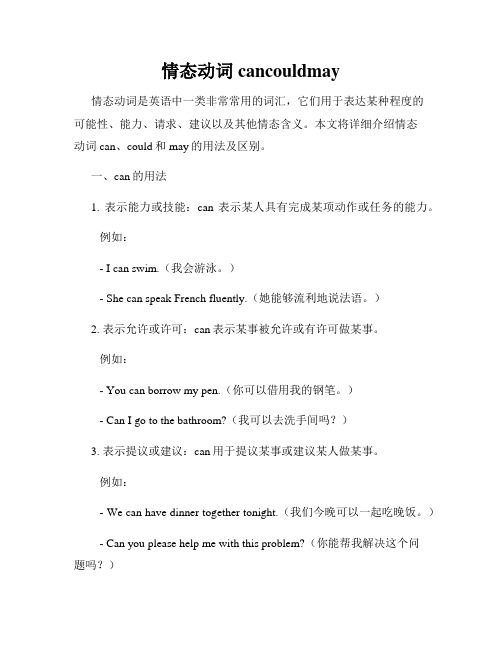
情态动词cancouldmay情态动词是英语中一类非常常用的词汇,它们用于表达某种程度的可能性、能力、请求、建议以及其他情态含义。
本文将详细介绍情态动词can、could和may的用法及区别。
一、can的用法1. 表示能力或技能:can表示某人具有完成某项动作或任务的能力。
例如:- I can swim.(我会游泳。
)- She can speak French fluently.(她能够流利地说法语。
)2. 表示允许或许可:can表示某事被允许或有许可做某事。
例如:- You can borrow my pen.(你可以借用我的钢笔。
)- Can I go to the bathroom?(我可以去洗手间吗?)3. 表示提议或建议:can用于提议某事或建议某人做某事。
例如:- We can have dinner together tonight.(我们今晚可以一起吃晚饭。
) - Can you please help me with this problem?(你能帮我解决这个问题吗?)1. 表示过去的能力或技能:could用于过去时态,表示过去某人具备的能力或技能。
例如:- When I was young, I could climb trees easily.(当我年轻的时候,我可以轻松地爬树。
)- He could speak three languages fluently when he was in college.(他在大学时能够流利地讲三种语言。
)2. 表示礼貌的请求:could用于礼貌地请求对方做某事。
例如:- Could you pass me the salt, please?(请你递给我盐好吗?)- Could I have a glass of water, please?(我能请你给我一杯水吗?)3. 表示非真实条件:could用于虚拟语气,表示非真实的条件或假设。
情态动词can和could之基本用法

许可: 1、can表示将来的许可通常与将来时间状语
连用。 (can表示能力时不需要时间状语) 2、could往往表示过去的许可
建议:could表示现在或将来时间,而不表示是 过去时间
请求: 1、Can \Could I\we---?表示请求对方允许我们
做某事 2、Can \Could you----?表示请求对方为我们做
昨天我追赶了一辆车,而且追上了它。
•表示许可(一般不用于表示现在的许可,而表示 过去的许可)
I could read what I liked when I was a child. 我小时候喜欢看什么书,就看什么书。
•表示建议和忠告(并不表示是过去时间) You could pick up a cake ,chocolate is her
can\could-------be able to may\might-----be allowed to must---------have(got)to shall\should\ought to-----be supposed to will\would-------be going to
The boy can be very naughty. 这孩子可能会很淘气。
情态动词can和could 之基本用法
水建锋
特殊用法 ↑
基本用法 ← 情态动词 → 推测性用法 ↓
(could \would\might\should) 用于虚拟意义的用法
can\could\may\might\will\would\ should\ought to\shall\must
need dare
favorite. 你可以买一份蛋糕嘛,巧克力口味的她最喜欢。
情态动词can和could用法详解.docx

情态动词 can 和 could用法详解can 和 could用法详解1.表示能力, could 是 can 的过去。
如:Can you speak English?你会说英语吗?Could you speak English then?那时候你会说英语吗?2.表示许可,注意以下用法:(1)对于现在或将来的“许可” ,要区分以下两种情况:a.表示请求允许( 即请求别人允许自己做某事) ,可用 can(=may) 或 could(=might)(这里的 could并不表示过去,而是表示现在,只是语气较委婉) 。
如:Can [May, Could, Might] I come in?我可以进来吗?b.表示给予允许( 即自己允许别人做某事) ,一般只用can(=may) ,而不能用could或might。
如:A: Could [Can] I use your pen?我可以借用你的钢笔吗?注意:B:Yes, of course you can. 当然可以。
( 注意 : 此处不用 Yes, you could)(2)对于过去的“许可” ,也要区分以下两种情况:a.表示过去一般性允许( 即表示某人随时都可以做某事) ,用 can 的过去式 ( 即 could)When I lived at home, I could watch TV whenever I wanted。
如:to. 我住在家里时,想什么时候看电影就可以什么时候看( 一般性允许 ) 。
b.表示过去特定的允许(即表示在过去某一特定情况下允许进行某一活动) ,则不用而需换成其它表达( 如: had permission或was [were] allowed to)。
如:I was allowed to see the film yesterday evening.昨天晚上允许我去看了电影could, ( 特定的允许,所以不能用could)。
3.表示推测:(1)对现在或将来的推测, can 通常只用于否定句或疑问句中,一般不用于肯定句:It can’ t be true.那不可能是真的。
情态动词can和could用法详解

情态动词c a n和c o u l d用法详解 Document number【980KGB-6898YT-769T8CB-246UT-18GG08】情态动词can和could 用法详解can 和 could 用法详解1. 表示能力,could 是 can 的过去。
如:Can you speak English 你会说英语吗Could you speak English then 那时候你会说英语吗2. 表示许可,注意以下用法:(1) 对于现在或将来的“许可”,要区分以下两种情况:a. 表示请求允许(即请求别人允许自己做某事),可用 can(=may)或could(=might)(注意:这里的 could 并不表示过去,而是表示现在,只是语气较委婉)。
如:Can [May, Could, Might] I come in 我可以进来吗b. 表示给予允许(即自己允许别人做某事),一般只用 can(=may),而不能用 could 或 might。
如:A: Could [Can] I use your pen 我可以借用你的钢笔吗B: Yes, of course you can. 当然可以。
(注意: 此处不用 Yes,you could)(2) 对于过去的“许可”,也要区分以下两种情况:a. 表示过去一般性允许(即表示某人随时都可以做某事),用 can的过去式(即could)。
如:When I lived at home, I could watch TV whenever I wantedto. 我住在家里时,想什么时候看电影就可以什么时候看 (一般性允许)。
b. 表示过去特定的允许( 即表示在过去某一特定情况下允许进行某一活动),则不用 could, 而需换成其它表达(如:had permission或 was [were] allowed to)。
如:I was allowed to see the film yesterday evening. 昨天晚上允许我去看了电影(特定的允许,所以不能用 could)。
情态动词can (could), may (might) 等的用法

情态动词有can (could), may (might), must, have to, shall (should, will (would), dare (dared), need (needed), ought to等。
情态动词无人称和数的变化;不能单独使用,必须与其后的动词原形构成谓语一、can, could1) 表示能力(体力、知识、技能)。
Can you lift this heavy box?(体力)Mary can speak three languages.(知识)Can you skate?(技能)此时可用be able to代替。
Can只有一般现在时和一般过去式;而be able to则有更多的时态。
I’ll not be able to come this afternoon.当表示“经过努力才得以做成功某事”时应用be able to,不能用Can。
如:He was able to go to the party yesterday evening in spite of the heavy rain.2) 表示请求和允许。
-----Can I go now?----- Yes, you can. / No, you can’t.此时可与may互换。
在疑问句中还可用could,might代替,不是过去式,只是语气更委婉,不能用于肯定句和答语中。
---- Could I come to see you tomorrow?---- Yes, you can. ( No, I’m afraid not. )3) 表示客观可能性(客观原因形成的能力)。
They’ve changed the timetable, so we can go by bus instead.This hall can hold 500 people at least.4) 表示推测(惊讶、怀疑、不相信的态度),用于疑问句、否定句和感叹句中。
情态动词之can,could
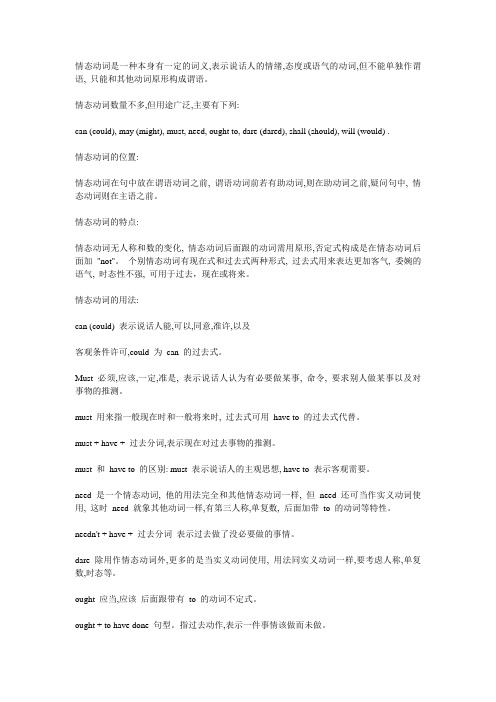
情态动词是一种本身有一定的词义,表示说话人的情绪,态度或语气的动词,但不能单独作谓语, 只能和其他动词原形构成谓语。
情态动词数量不多,但用途广泛,主要有下列:can (could), may (might), must, need, ought to, dare (dared), shall (should), will (would) .情态动词的位置:情态动词在句中放在谓语动词之前, 谓语动词前若有助动词,则在助动词之前,疑问句中, 情态动词则在主语之前。
情态动词的特点:情态动词无人称和数的变化, 情态动词后面跟的动词需用原形,否定式构成是在情态动词后面加"not"。
个别情态动词有现在式和过去式两种形式, 过去式用来表达更加客气, 委婉的语气, 时态性不强, 可用于过去,现在或将来。
情态动词的用法:can (could) 表示说话人能,可以,同意,准许,以及客观条件许可,could 为can 的过去式。
Must 必须,应该,一定,准是, 表示说话人认为有必要做某事, 命令, 要求别人做某事以及对事物的推测。
must 用来指一般现在时和一般将来时, 过去式可用have to 的过去式代替。
must + have + 过去分词,表示现在对过去事物的推测。
must 和have to 的区别: must 表示说话人的主观思想, have to 表示客观需要。
need 是一个情态动词, 他的用法完全和其他情态动词一样, 但need 还可当作实义动词使用, 这时need 就象其他动词一样,有第三人称,单复数, 后面加带to 的动词等特性。
needn't + have + 过去分词表示过去做了没必要做的事情。
dare 除用作情态动词外,更多的是当实义动词使用, 用法同实义动词一样,要考虑人称,单复数,时态等。
ought 应当,应该后面跟带有to 的动词不定式。
ought + to have done 句型。
情态动词can与could用法归纳

cancould 1 表示现在的能力,用can: I can’t decide which to choose.我不能决定选哪个好。
While I sympathize I can’t really do much to help.尽管我很同情,我却不能真正帮多少忙。
2表示将来的能力,通常不用can或could,而用be able to的将来时态: I’ll be able to speak French in another few months. 再过几个月我就会讲法语了。
One day people will be able to go to the moon on holiday. 总有一天人们可以到月球上去度假。
但是,若表示现在决定将来是否有能力做某事,则可用 can: Can you come to the party tomorrow 你明天能来参加我们的聚会吗? 3表示过去的能力,有时可用could,有时不能用could,具体应注意以下几点:①若表示过去一般的能力即想做某事就随时可做某事的能力,可用could: Could you speak English then 那时候你会说英语吗②若表示过去的特定能力即在过去特定场合做某事的能力,则不能用could,而用was were able to do sth,或用 managed to do sth,或用 succeeded in doing sth 等。
He studied hard and was able to pass the exam. 他学习很努力,所以考试能及格。
At last he succeeded in solving the problem. 他终于把那个问题解决了。
【注】could不用来表示过去特定能力通常只限于肯定句,否定句或疑问句中,它则可以表示过去特定的能力: I managed to find the street but I couldn’t find her house.我想法找到了那条街,但没找到她的房子。
情态动词 can,could

情态动词 can/could 4个不同用法
2,语气不同,与时态无关: could语气更委婉 ➢ Can you help me? ➢ Could you help me? ➢ Can you open the door please? ➢ Could you open the door please?
B: No, I ______.
2. 按要求完成句子。 1. He can ride a bike. (改为一般疑问句和否定句,并作肯定和否定回答) 一般疑问句_________________________ 否定句____________________________ 肯定回答_______________ 否定回答__________________ 2.你会弹吉他吗? _______ you ________ _________ guitar? 3.两年前我不会骑自行。 I _______ _________ a bike two years ________ .
can/can't 与 could/couldn't
情态动词can与could用法归纳
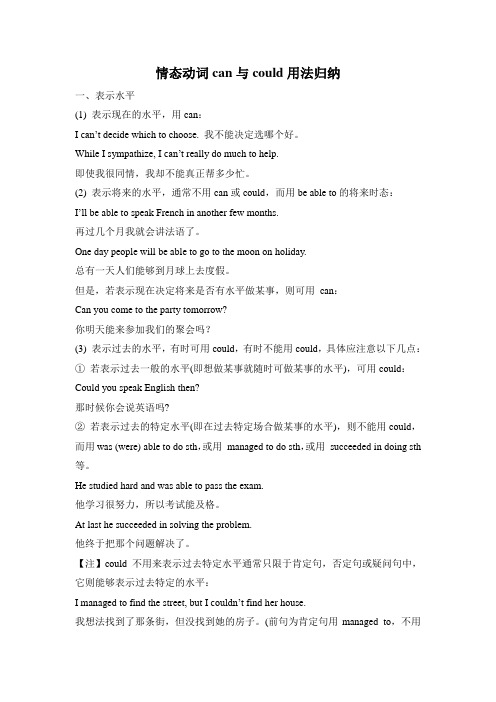
情态动词can与could用法归纳一、表示水平(1) 表示现在的水平,用can:I can’t decide which to choose. 我不能决定选哪个好。
While I sympathize, I can’t really do much to help.即使我很同情,我却不能真正帮多少忙。
(2) 表示将来的水平,通常不用can或could,而用be able to的将来时态:I’ll be able to speak French in another few months.再过几个月我就会讲法语了。
One day people will be able to go to the moon on holiday.总有一天人们能够到月球上去度假。
但是,若表示现在决定将来是否有水平做某事,则可用can:Can you come to the party tomorrow?你明天能来参加我们的聚会吗?(3) 表示过去的水平,有时可用could,有时不能用could,具体应注意以下几点:①若表示过去一般的水平(即想做某事就随时可做某事的水平),可用could:Could you speak English then?那时候你会说英语吗?②若表示过去的特定水平(即在过去特定场合做某事的水平),则不能用could,而用was (were) able to do sth,或用managed to do sth,或用succeeded in doing sth 等。
He studied hard and was able to pass the exam.他学习很努力,所以考试能及格。
At last he succeeded in solving the problem.他终于把那个问题解决了。
【注】could 不用来表示过去特定水平通常只限于肯定句,否定句或疑问句中,它则能够表示过去特定的水平:I managed to find the street, but I couldn’t find her house.我想法找到了那条街,但没找到她的房子。
情态动词can,could,mu...
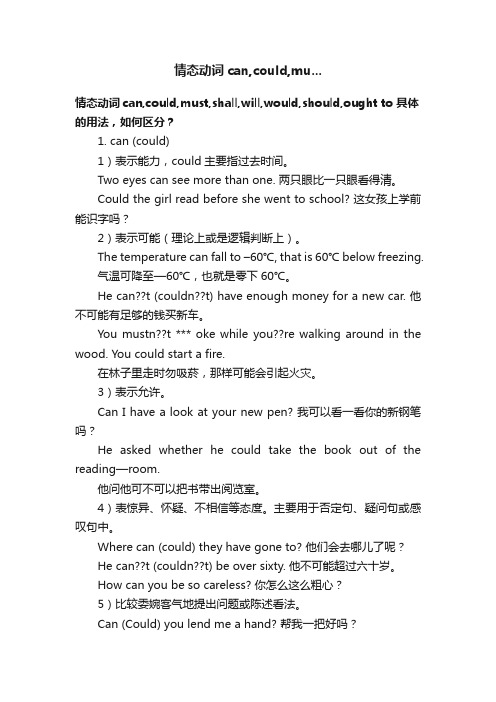
情态动词can,could,mu...情态动词can,could,must,shall,will,would,should,ought to 具体的用法,如何区分?1. can (could)1)表示能力,could主要指过去时间。
Two eyes can see more than one. 两只眼比一只眼看得清。
Could the girl read before she went to school? 这女孩上学前能识字吗?2)表示可能(理论上或是逻辑判断上)。
The temperature can fall to –60℃, that is 60℃ below freezing.气温可降至—60℃,也就是零下60℃。
He can??t (couldn??t) have enough money for a new car. 他不可能有足够的钱买新车。
You mustn??t *** oke while you??re walking around in the wood. You could start a fire.在林子里走时勿吸菸,那样可能会引起火灾。
3)表示允许。
Can I have a look at your new pen? 我可以看一看你的新钢笔吗?He asked whether he could take the book out of the reading—room.他问他可不可以把书带出阅览室。
4)表惊异、怀疑、不相信等态度。
主要用于否定句、疑问句或感叹句中。
Where can (could) they have gone to? 他们会去哪儿了呢?He can??t (couldn??t) be over sixty. 他不可能超过六十岁。
How can you be so careless? 你怎么这么粗心?5)比较委婉客气地提出问题或陈述看法。
Can (Could) you lend me a hand? 帮我一把好吗?I??m afraid we couldn??t give you an answer today. 恐怕我们今天不能给你答复。
中考英语情态动词考点归纳与例析
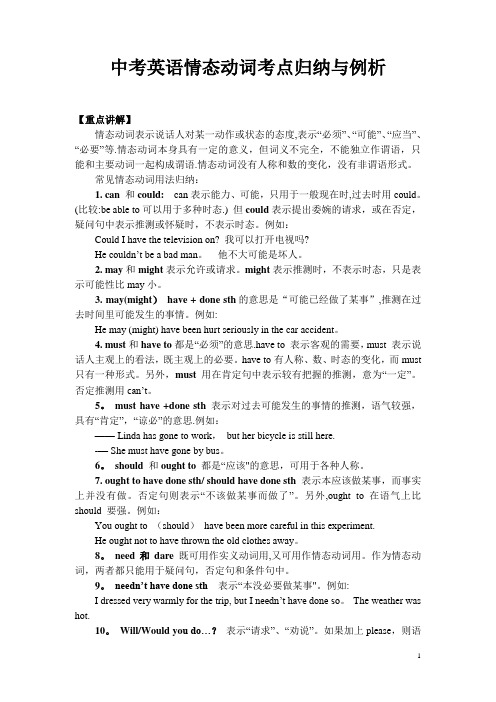
中考英语情态动词考点归纳与例析【重点讲解】情态动词表示说话人对某一动作或状态的态度,表示“必须”、“可能”、“应当”、“必要”等.情态动词本身具有一定的意义,但词义不完全,不能独立作谓语,只能和主要动词一起构成谓语.情态动词没有人称和数的变化,没有非谓语形式。
常见情态动词用法归纳:1.can和could: can表示能力、可能,只用于一般现在时,过去时用could。
(比较:be able to可以用于多种时态.) 但could表示提出委婉的请求,或在否定,疑问句中表示推测或怀疑时,不表示时态。
例如:Could I have the television on? 我可以打开电视吗?He couldn’t be a bad man。
他不大可能是坏人。
2. may和might表示允许或请求。
might表示推测时,不表示时态,只是表示可能性比may小。
3. may(might)have + done sth的意思是“可能已经做了某事”,推测在过去时间里可能发生的事情。
例如:He may (might) have been hurt seriously in the car accident。
4. must和have to都是“必须”的意思.have to 表示客观的需要,must 表示说话人主观上的看法,既主观上的必要。
have to有人称、数、时态的变化,而must 只有一种形式。
另外,must用在肯定句中表示较有把握的推测,意为“一定”。
否定推测用can’t。
5。
must have +done sth 表示对过去可能发生的事情的推测,语气较强,具有“肯定”,“谅必”的意思.例如:—— Linda has gone to work,but her bicycle is still here.-— She must have gone by bus。
6。
should和ought to 都是“应该"的意思,可用于各种人称。
英语语法大全之一般过去时(5)情态动词cancould的用法
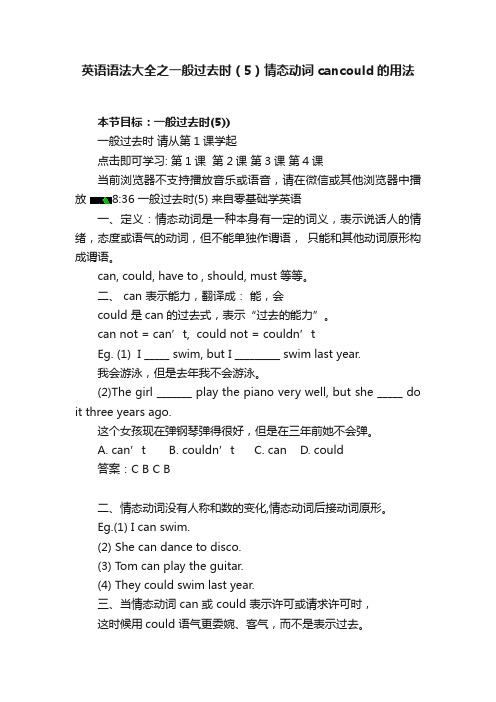
英语语法大全之一般过去时(5)情态动词cancould的用法本节目标:一般过去时(5))一般过去时请从第1课学起点击即可学习: 第1课第2课第3课第4课当前浏览器不支持播放音乐或语音,请在微信或其他浏览器中播放8:36 一般过去时(5) 来自零基础学英语一、定义:情态动词是一种本身有一定的词义,表示说话人的情绪,态度或语气的动词,但不能单独作谓语,只能和其他动词原形构成谓语。
can, could, have to , should, must 等等。
二、 can 表示能力,翻译成:能,会could 是can的过去式,表示“过去的能力”。
can not = can’t, could not = couldn’tEg. (1) I _____ swim, but I _________ swim last year.我会游泳,但是去年我不会游泳。
(2)The girl _______ play the piano very well, but she _____ do it three years ago.这个女孩现在弹钢琴弹得很好,但是在三年前她不会弹。
A. can’tB. couldn’tC. canD. could答案:C B C B二、情态动词没有人称和数的变化,情态动词后接动词原形。
Eg.(1) I can swim.(2) She can dance to disco.(3) Tom can play the guitar.(4) They could swim last year.三、当情态动词 can 或 could 表示许可或请求许可时,这时候用could 语气更委婉、客气,而不是表示过去。
eg. (1) Can I watch TV now?我现在能看电视吗?(2) Could you help me?你能帮我吗?(3) Could you please tell me the way to the hospital?你能告诉我去医院的路吗?闯关练习:1.Jane _____ speak Chinese well now, but she ______ only speak it a little last year.A. could, canB. can, couldC. can, couldn’t2. Jane ____ play the guitar, but she _______ do it two years ago.A. can, couldB. could, can’tC. can, co uldn’t3. --- Can she _______?---No, she ______.A. swims , can’tB. swim, canC. swim, can’t4. She ______ play the piano when she was5.A. canB. couldC. can’t5.---What _____ you do when you were 10?--- I could play the guitar, but I _______ swim.A. can couldB. could, couldC. could, couldn’t 答案: BCCBC。
情态动词can和could的用法区别_

情态动词can和could的用法区别_(1)表示能力(could为can的过去式,表过去的能力)Some of us can use the computer now, but we couldn t 10 years ago现在我们有些人会使用电脑,但十年前我们不会。
【知识拓展】①can与be able to都表示能力,在意义上没有区别。
但can只有一般式和过去式(could)两种形式,而be ableto则有更多的形式。
过去式:was/were able to将来式:shall/will be able to完成式:have/has been able to②如果要表达将来的能力,一般要用will/shall beable toThe baby will be able to walk in a few weeks.几周后这个婴儿就会走路了。
③be able to的过去式was/were able to可表示在过场合设法做成了某事,相当于managed to do,而could则无此意义。
The fire was very big, but most people were able to escape from it那场火很大,但多数人从火中逃了出来。
④can 和be able to不可同时使用。
(2)允许和许可。
You can park your car here.你可以把车停在这里。
Can I use your pen?我可以用你的钢笔吗?Yes,you can 是的,你可以No you can t.不,你不可以。
子这种语竟中,用could比用can的语气更委婉 ;can此时没有时间上的差别,could -般,肯定回答时要改用can。
Could I come here again tomorrow?我明天还能来这儿吗?一Yes,you can(或:No,I m afraid not.)是的,你可以。
情态动词can,couldwill与would的用法和区别

情态动词can,couldwill与would的用法和区别一、情态动词can的用法1. 表示能力,意思是:能,会。
如:I can't swim. 我不会游泳。
Can you drive?你会开车吗?2. 表示客观可能性,意思是:可以,可能。
如:That big cinema can seats 2,000 people. 那家大电影院能坐2000人。
He can be very friendly at times. 有时他会很友好。
3. 表示允许(和may意思相近),意思是:可以,能够。
如:You can have the book when I have finished it. 书我看完了可以给你。
Can I use your pen?我可以用你的钢笔吗?4. 表示惊异、不相信等(用于疑问句、否定句或感叹句中),意思是:会,可能。
如:This can't be true. 这不可能是真的。
Can it be true?这可能是真的吗?二、情态动词could的用法1. 表示“能力”或“可能性”,作为can的过去形式。
如:Could you speak English then?那时你能讲英语吗?He said he couldn't follow me. 他说他跟不上我。
2. 表示惊异、怀疑、不相信等情绪。
如:Who could have taken them?谁会把它们拿走了呢?She couldn't have left so soon. 她不可能这么快就走了。
在这种情况下,could和can是可以换用的,用could时口气较缓和,用can时不相信的程度更强一些,两者在时间上没有差别。
3. 比较委婉客气地提出问题或陈述看法。
如:/P>—Could you let me have your passport?—Yes, here it is.—看看你的护照好吗?—行,这就是。
- 1、下载文档前请自行甄别文档内容的完整性,平台不提供额外的编辑、内容补充、找答案等附加服务。
- 2、"仅部分预览"的文档,不可在线预览部分如存在完整性等问题,可反馈申请退款(可完整预览的文档不适用该条件!)。
- 3、如文档侵犯您的权益,请联系客服反馈,我们会尽快为您处理(人工客服工作时间:9:00-18:30)。
can (could)用于否定或疑问句中后面跟动词原形的完成式时,表示对过去发生事件的“可能性”。
而could较can更加表示说话人的“不肯定的”语气。
如:
Can he have left already?他会是走了吗?
Could she have forgotten my address?她会把我的地址忘记了吗?
It couldn't have been henry. He has gone to the factory.不可能是亨利,他已经去工厂了。
Surely she can not have arrived so early.他当然不可能这么早到这里的。
注:could加动词的完成式时,有时表示“过去可能完成但事实上并没有实现的动作”。
如:
You could have done the work better.你本来可以做得更好些。
(事实上你做得不那么好)
You could have got the early train.你本来可以搭上早班火车的。
(事实上没搭上)。
